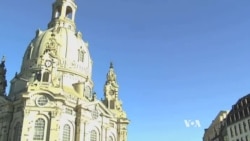The bells of Dresden’s Frauenkirche ring out across the city’s central square, which is ringed by stunning baroque architecture glinting in the winter sun.
Horse-and-carriage tours take tourists through the picturesque cobbled lanes. Dresden was destroyed in World War II; its beauty was restored after the German reunification.
In the last few months, the city has become a political battleground. tens of thousands of Germans have gathered regularly to protest what they see as the Islamization of the West, but they display a range of other grievances as well. Monday's crowd for the march was the biggest yet — 25,000 people.
These protests organized by the Patriotic Europeans Against the Islamization of the West, or PEGIDA, have blossomed because of a political vacuum, said professor Werner Patzelt of Dresden University.
“It is consensus in German society never again to let fascism come back to Germany," he said. "We have a kind of representation gap in the right side of the political spectrum. And it is in this gap in which the PEGIDA movement and parties like Alternatif fur Deutschland [Alternative for Germany] have broken in."
Alternative for Germany won close to 10 percent of the vote in Saxony state elections in August. Party officials have joined the marches. Local party chief Bernd Lommel said Dresden’s history partly explains PEGIDA’s origins.
He said there are people who feel that unification did not benefit them. Others, he said, feel they have lost, and they're uncertain about their future.
Yet city is prosperous
But Dresden does not conform to the stereotype of an economically depressed city in the former East Germany that has turned to extreme politics. The city is relatively prosperous. Instead, some analysts trace Dresden’s polarized politics back to the war.
In February 1945, American and British bombers dropped 4,000 tons of explosives on Dresden, destroying the city. Twenty-five thousand people were killed. The anniversary is still marked every year with protest marches through Dresden’s rebuilt center. The history shapes the worldview of many PEGIDA supporters, Patzelt said.
“The argument runs basically like this: Dresden has been destroyed by Americans and English bombers. Americans have never stopped bombing around the world. Now they bomb in the Near East [Middle East]. They destroy states there. As a result, we have so many refugees,” he said.
Patzelt said the Russian flags seen during PEGIDA marches indicate the desire among some for a counterweight to American power. The misunderstandings should not be simply dismissed, said local politician Jan Donhauser of the Christian Democrats, the party of German Chancellor Angela Merkel.
“With PEGIDA, it’s not just about asylum policies. There are many other things that are making people unhappy, that draw them to movements like this. We have to recognize that, though I have to disagree with them, because we in the East have never had it this good. But still, as a politician," he added, “I have to take it seriously.”
Wrong approach seen
Merkel attended a pro-unity rally Tuesday in Berlin, organized by Muslim groups. She has strongly condemned the PEGIDA marchers, saying they have "hatred in their hearts."
Patzelt said that's the wrong approach.
“Saying, ‘Well, we have to get rid of all these movements, we have to oppress giving voice to these feelings and opinions,' then you really augment or nourish these movements,” he said.
Patzelt predicted that the PEGIDA movement eventually would be absorbed into a political group such as Alternative for Germany. For now, the marchers insist they will return next Monday — and every week — until their voices are heard.





